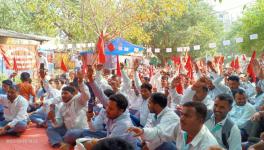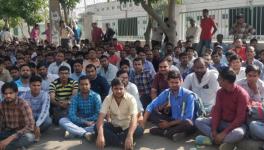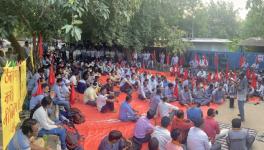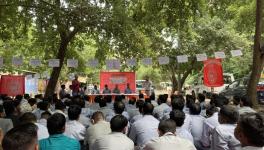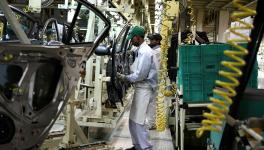Manesar: Pick-Up in Auto Production ‘Benefits’ Workers, But in a Different Way
New Delhi: With festive season demand picking up, workers in Manesar’s auto hub are more than busy after a lull during the pandemic-induced lockdown. But, while auto companies sigh with relief, the workers stare at more work with the same or lower wages and changed job status.
“I have a question,” said Devendra Yadav, 23, who was in a hurry since he had didn’t have much time to spare for a telephonic conversation. “Are only we supposed to bear the brunt of this pandemic, and not our company?” he asked.
This question had troubled Yadav (name changed to ensure privacy) over the past few months, as has been the case with other factory workers in Haryana’s Gurugram-Manesar industrial belt.
Known for being an auto hub of the country, majority of the companies in Manesar are currently showing signs of stabilisation, with production – geared by festive demand – picking up to pre-COVID levels. The turnaround, however, is less meaningful for auto workers, who now have more work in their hands but with fewer wages and greater job insecurity.
Take the case of Yadav. He was a contract worker for three years in auto component manufacturer Denso in Manesar till the sudden countrywide lockdown happened and work stopped on March 25. He was among those called back for work in May this year after the production resumed. The only catch was that this time, Yadav returned as a trainee under the state-backed National Employability Enhancement Scheme (NEEM).
“Either join as a trainee or look for another job – this was the only option I had,” said Yadav, whose new ID card now carries “NEEM TRAINEE” as the job status. The company, which has now resumed production to all three work shifts in a day, as opposed to only one back in May, has obviously gained by the option that Yadav was forced to choose.
“Now I don’t get any social security – PF (provident fund) or ESI (employees’ state insurance), nor am I expecting to receive any bonus this Diwali” he said. The company is also saving on the statutory deductions, otherwise applicable to regular employees, as contracts under the training scheme are not constituted as employment.
The scheme, that is said to have gained traction in Manesar in recent years, was launched by the Congress-led United Progressive Alliance government in 2013, and was further greased by the Bharatiya Janata Party-led Narendra Modi government.
However, despite the demotion, Yadav considers himself “fortunate”, for he knows that countless youth in the Millennium City’s industrial town are jobless and would be desperate to replace him even as a trainee.
One such person is Ashok Kumar Roy, who said he would “take up anything” as he has been searching for work since March this year. Before that, the 35-year old was working on contractual basis at the Honda plant in Manesar. Roy was among those who had to submit their resignation to the contractor and “collect their dues”, following a four-month long agitation against contractualisation.
“Ever since then, I have been looking for a job. Companies refuse to employ me after knowing about my participation in the Honda protest. Contractors demand money before ensuring any work,” he told NewsClick.
Roy, who has a decade-long work experience, said: “Despite the festive season, when more labour is usually required, I am not able to secure any job.”
Roy and Yadav’s situation broadly reflect what lies in store post- pandemic-triggered economic disruption in the manufacturing sector, which is less likely to provide any respite to the labour force, even if there the sector’s slump is eased.
Official data seems to be corroborating this: the country’s factory activity expanded at its fastest rate in over a decade in October, showed the Nikkei Manufacturing Purchasing Managers’ Index on Monday. The IHS Markit, which had compiled the figures, however contended that the said manufacturing activity growth hasn’t brought any change to the seven month-long streak of firms cutting their staff.
Likewise, on Sunday, automobile industry heavyweights such as Maruti Suzuki, Hyundai and Hero reported ballooning of sales in October, compared with that in the same month last year – but remained sceptic of witnessing it after Diwali.
Jayan Jose Thomas, who teaches Economics at IIT-Delhi, believed that while the overall factory output numbers are “not surprising at all” given that the movement restrictions are being eased now, the sale figures of auto firms must be studied from a viewpoint of a slowdown that had prominently affected the industry last year, even before the COVID-19.
That is why “the current growth numbers shouldn’t be celebrated as such because it is not driven by an increase in wages,” he said. “Companies have cut down wages and will stick to it even when the production seems to register an uptick possibly to increase their profit share in the short term. This will, as a whole, affect the economy in the long run, as there won’t be any generation of demand,” he said.
Thomas said it was the Centre that actually pushed this phenomenon. “A private company is obviously going to be concerned about its profits. The government should have intervened to ensure proper wage levels by increasing rates under the rural employment guarantee scheme or increasing the social securities,” he said.
The distress faced by workers, however, continues in Manesar’s industrial belt. “Even now, we hear stories of lay-offs, salary cuts and the continuing delay in settling wage agreements,” said Satbir Singh, vice president, Centre of Indian Trade Union (CITU), adding that a convention of all company unions is scheduled on Tuesday, November 3, to prepare for the general strike later in this month.
Manmohan Gaind, general secretary, Manesar Industries Welfare Association, also confirmed a “good situation” in 60-65% of the companies in Manesar now, but rejected claims of workers not getting benefitted.
Asked about the general strike, Gaind said: “This is nothing but unions trying to regain their relevance.. let them do whatever they want, the industry will not suffer as recovery is on track and majority of the workers know that there situation will get better with it.”
Interestingly, Yadav of Denso did benefit from his demotion to a trainee. He was saved from paying monthly commission to his contractor. To his advantage, the company has also maintained his earlier wage rate – Rs. 14,000 per month – that he now receives fully without any deductions, made earlier in the name of social benefits. So, is it a win-win?
Not quite so. “All hope is gone now of becoming a permanent employee here,” rued Yadav, adding that 2014 was anyway the last year when any temporary worker was awarded permanent status.
“I might even have to leave after my ‘training’ period ends in three years” , he said, adding that “of course, after passing the mandatory exam and with a certificate.”
Get the latest reports & analysis with people's perspective on Protests, movements & deep analytical videos, discussions of the current affairs in your Telegram app. Subscribe to NewsClick's Telegram channel & get Real-Time updates on stories, as they get published on our website.













